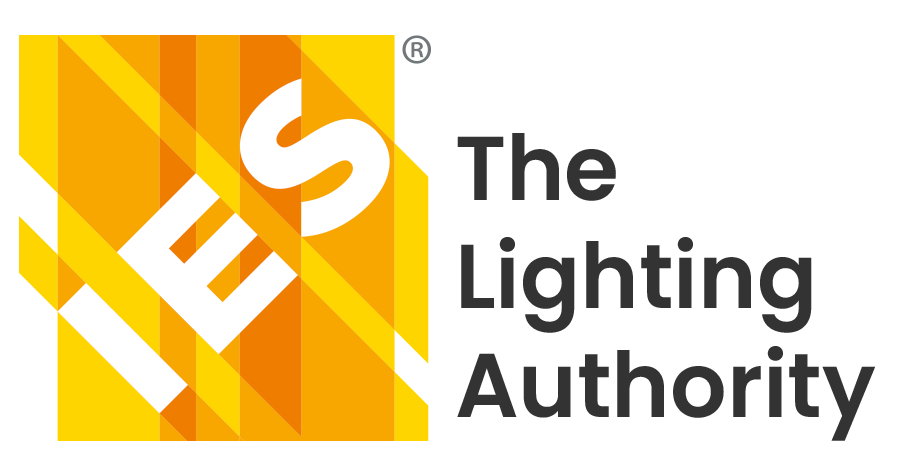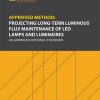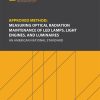Measuring Luminous Flux Waveforms for Use in Temporal Light Artifact (TLA) Calculations
$60.00
Member Price: $40.00
ANSI/IES LM-90-20
Document Type: Lighting Measurement and Testing (LM)
Available as a downloadable secure PDF only.
To stay current with all IES standards, we recommend subscribing to the The Lighting Library as an Individual or through your company as a Sustaining Member.
In stock
Product Description
 Cyclic variations in luminous output from a light source or lighting system are known as temporal light modulation (TLM). TLM is known to affect visual perception, cognition, and brain activity. The variety of TLM patterns of solid-state lighting has brought these effects to the attention of the lighting community. Research seeks to create new metrics that predict the occurrence of visual, cognitive, and neurological effects based on measurements of the physical stimulus, the luminous flux waveform. This document describes the procedures to be followed and precautions to be observed in performing reproducible luminous flux waveform measurements for use in temporal light artifact (TLA) calculations under standard conditions. It provides a description of the method of measurement, equipment requirements, and formulation of luminous flux waveforms for use in the calculations of temporal light artifacts from light sources. Luminous flux waveforms utilized in TLA calculations are for luminous flux frequencies between 1 Hz and 3,000 Hz under various control conditions. In addition, data reporting formats are described. Intentionally flashing or signaling lights outside the defined frequency range are not included within the scope of this document.
Cyclic variations in luminous output from a light source or lighting system are known as temporal light modulation (TLM). TLM is known to affect visual perception, cognition, and brain activity. The variety of TLM patterns of solid-state lighting has brought these effects to the attention of the lighting community. Research seeks to create new metrics that predict the occurrence of visual, cognitive, and neurological effects based on measurements of the physical stimulus, the luminous flux waveform. This document describes the procedures to be followed and precautions to be observed in performing reproducible luminous flux waveform measurements for use in temporal light artifact (TLA) calculations under standard conditions. It provides a description of the method of measurement, equipment requirements, and formulation of luminous flux waveforms for use in the calculations of temporal light artifacts from light sources. Luminous flux waveforms utilized in TLA calculations are for luminous flux frequencies between 1 Hz and 3,000 Hz under various control conditions. In addition, data reporting formats are described. Intentionally flashing or signaling lights outside the defined frequency range are not included within the scope of this document.
Page count: 25 pages
Publisher: Illuminating Engineering Society (2020)
SKU: ANSI/IES LM-90-20
ISBN-13: 978-0-87995-063-7
Chapters:
- 1.0 Introduction and Scope
2.0 Normative References
3.0 Ambient and Physical Test Conditions
4.0 Test Equipment
5.0 Measurement Process
6.0 Luminous Flux Waveform Data File
7.0 Uncertainty Analysis
Citation Format:
Illuminating Engineering Society. ANSI/IES LM-90-20, Approved Method: Measuring Luminous Flux Waveforms for Use in Temporal Light Artifact (TLA) Calculations. New York: IES; 2020.
CONTENTS
- 1.0 Introduction and Scope
- 1.1 Introduction
- 1.2 Scope
- 2.0 Normative References
- 2.1 CIE TN 006:2016
- 2.2 IES LM-9-09/R17
- 2.3 ANSI/IES LM-45-20
- 2.4 ANSI/IES LM-51-20
- 2.5 ANSI/IES LM-66-20
- 2.6 ANSI/IES LM-78-17
- 2.7 ANSI/IES LM-79-19
- 2.8 ANSI/IES LS-1-20
- 2.9 NEMA 77-2017
- 2.10 NEMA SSL 7A-2015
- 3.0 Ambient and Physical Test Conditions
- 3.1 Ambient Temperature
- 3.2 Air Movement
- 3.3 Vibration
- 3.4 Humidity
- 3.5 Stray Light
- 4.0 Test Equipment
- 4.1 Power Analyzer
- 4.2 Dimmer
4.2.1 Forward Phase-Cut Dimming
4.2.2 Application Specific Dimming - 4.3 Test Chamber
4.3 1 Integrating Sphere
4.3.2 Optically Isolated Chamber or Dark Room - 4.4 Oscilloscope or Digitizer
- 4.5 Transimpedance Amplifier
- 4.6 Low-Pass Filter
- 4.7 Photodetector
- 4.8 Voltage Differential Probe
- 5.0 Measurement Process
- 5.1 Setup
- 5.2 Input Power
5.2.1 Standard Input Power
5.2.2 Nonstandard Input Power - 5.3 Input Voltage
- 5.4 Dimming
- 5.5 Stabilization
- 5.6 Measurement
5.6.1 Dark signal - 6.0 Luminous Flux Waveform Data File
- 6.1 Version Element
- 6.2 Header Element
6.2.1 Manufacturer Element
6.2.2 Product Number Element
6.2.3 Description Element
6.2.4 Configuration
6.2.5 Laboratory Element
6.2.6 Report Number Element
6.2.7 Report Date Element
6.2.8 Comment Element - 6.3 Equipment Element
6.3.1 Test Chamber Element
6.3.2 Measurement Equipment Element
6.3.3 Auxiliary Equipment Element
6.3.4 Setup Media Element - 6.4 TLA Data Element
6.4.1 Nonstandard Conditions Element
6.4.2 Additional Information Element
6.4.3 Uncertainty Statement Element
6.4.4 Rated Electrical Input Element
6.4.5 Frequency Element
6.4.6 DUT Measurement Data Element - 7.0 Uncertainty Analysis
- Informative Annex A – Descriptions of TLA Metrics
- Informative Annex B – XML Schema
- Informative Annex C – Sample TLA XML Document
- Informative Annex D – Uncertainty Example



